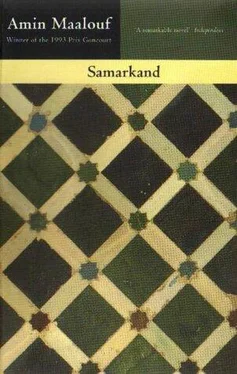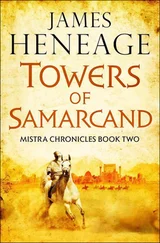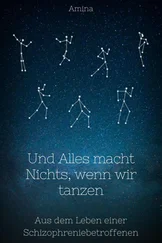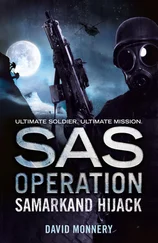It was my luck to be in the Registan Square one morning. A caravan was passing. It was a short caravan, consisting of just six or seven thick-haired and heavy-hoofed Bactrian camels. The old camel-driver had stopped not far from me in front of a potter’s stall, holding a new-born lamb to his chest; he proposed a barter and the craftsman discussed it; without taking his hands off the jar or the wheel, he pointed with his chin toward a pile of varnished vessels. I watched the two men with their black-bordered woollen hats, their striped robes, reddish beards and their ancient gestures. Was there any detail of this scene which had not come down unchanged from the time of Khayyam?
There was a slight breeze and the sand started to swirl, their clothing billowed and the whole square was covered with an unreal haze. I cast my eyes around. At the edge of the square rose three monuments, three gigantic complexes of towers, domes, gateways and high walls completely covered with minute mosaics, arabesques studded with gold, amethyst and turquoise, and intricate calligraphy. It all retained its majesty, but the towers were leaning, the domes had gaping holes, the facades were crumbling, ravaged by time, wind and centuries of neglect; people no longer looked at these monuments, these haughty, proud and forgotten giants which provided an imposing backdrop for a derisory play.
I was retreating backwards and stepped on someone’s foot. When I turned round to apologize I was face to face with a man dressed like me in European clothing, a man who had set sail from the same distant planet. We struck up a conversation. He was Russian, an archaeologist. He also had come with a thousand questions, but he already had some answers.
‘In Samarkand, time moves from one cataclysm to the next and from one tabula rasa to the next. When the Mongols destroyed the city in the thirteenth century, its various districts were left a mass of ruins and corpses. It had to be abandoned; the survivors went to rebuild their dwellings on another site, further to the south, with the result that the whole of the old city, the Samarkand of the Seljuks, was gradually covered by layers of sand and became a raised field. There are treasures and secrets under the ground, but the surface is a pasture. One day it will all have to be opened up, the houses and the street dug up. Once freed, Samarkand will be able to tell us its history.’
He broke off.
‘Are you an archaeologist?’
‘No. This city attracts me for other reasons.’
‘Would it be impolite of me to ask what they are?’
I told him of the manuscript, the poems, the chronicle, and the paintings which evoked the lovers of Samarkand.
‘I would love to see that book! Do you know that everything from that time has been destroyed — as if by a curse. Walls, palaces, orchards, gardens, water-pipes, religious sites, books and the principal objets d’art. The monuments which we admire today were all built later by Tamerlane and his descendants. They are less than five hundred years old. From Khayyam’s era we only have potsherds and, as you have just informed me, this manuscript which has miraculously survived. It is a privilege for you to be able to hold it in your hands and read it at your leisure. It is a privilege and also a heavy responsibility.’
‘Believe me, I am quite aware of that. For years, ever since I learnt that this book existed, I have lived for nothing else. It has led me from adventure to adventure, its world has become mine and its guardian my beloved.’
‘And have you made this trip to Samarkand to discover the places it describes?’
‘I was hoping that the townspeople would be able at least to give me some indication of where the old districts lay.’
‘I am sorry to have to disappoint you,’ the Russian continued, ‘but if you are searching for something from the period for which you have a fascination, you will only gather legends, stories of jinns and divs. This city cultivates them with delight.’
‘More than other cities in Asia?’
‘I am afraid so. I wonder if the proximity of these ruins does not naturally inflame the imagination of our miserable contemporaries. Then there is the city which is buried under the ground. Over the centuries how many children have fallen down cracks never to reappear, what strange sounds people have heard or thought that they heard, apparently coming out of the entrails of the earth! That is how Samarkand’s most famous legend was born — the legend which had a lot to do with the mystery which envelops the name of the city.’
I let him tell the story.
‘It was told that a king of Samarkand wanted to make everyone’s dream come true: to escape death. He was convinced that death came from the sky and he wanted to do something so that it could never reach him, so he built an immense underground palace of iron which he made inaccessible.
‘Being fabulously rich, he also had fashioned an artificial sun, which rose in the morning and set in the evening, to warm him and indicate the passing of days.
‘Alas, the God of Death managed to foil the monarch’s vigilance and he slipped inside the palace to accomplish his job. He had to show all humans that no creature could escape death, no matter how powerful, skilful or arrogant he was. Samarkand thus became the symbol of the inescapable meeting between man and his destiny.’
And after Samarkand, where to? For me it was the furthest extremity of the Orient, the place of all wonders and unfathomable nostalgia. The moment I left the city I decided to go back home; my desire was to be back in Annapolis and to spend some sedentary years there resting from my travels and only then to set off again.
I thus drew up the most insane plan — that of going back to Persia to fetch Shireen and the Khayyam manuscript, and then to go off and disappear in some great metropolis, such as Paris, Vienna or New York. For the two of us to live in the West but to an oriental rhythm; would that not be paradise?
On my way back, I was continually alone and distracted, preoccupied solely with the arguments that I was going to present to Shireen. ‘Leave? Leave …?’ she would say wearily. ‘Is it not enough for you to be happy?’ However, I did not despair of being able to overcome her reservations.
When the convertible which I had rented at the edge of the Caspian set me down at Zarganda in front of my closed door, there was a car there already, a Jewel-40 sporting a star-spangled banner right in the middle of its hood.
The chauffeur stepped out and enquired as to my identity. I had the idiotic impression that he had been waiting for me ever since I left. He reassured me that he had only been there since the morning.
‘My master told me to stay here until you came back.’
‘I might have come back in a month, a year or perhaps never.’
My astonishment hardly upset him.
‘But you are here now!’
He handed me a note scribbled by Charles W. Russell, minister plenipotentiary of the United States.
Dear Mr Lesage ,
I would be most honoured if you could come to the Legation this afternoon at four o’clock. It is a matter of great importance and urgency. I have asked my chauffeur to remain at your disposal.
Two men were waiting for me at the legation, with the same suppressed impatience. Russel, in a grey suit, a moiré bow-tie and with a drooping moustache like Theodore Roosevelt’s but more carefully shaped; and Fazel, in his undeviating white tunic, black cape and blue turban. Naturally it was the diplomat who opened the session in hesitant but correct French.
‘The meeting taking place today is one of those that change the course of history. In our persons, two nations are meeting, defying distances and differences: the United States, which is a young nation but already an old democracy, and Persia which is an old nation, several thousand years old, but a brand-new democracy.’
Читать дальше












